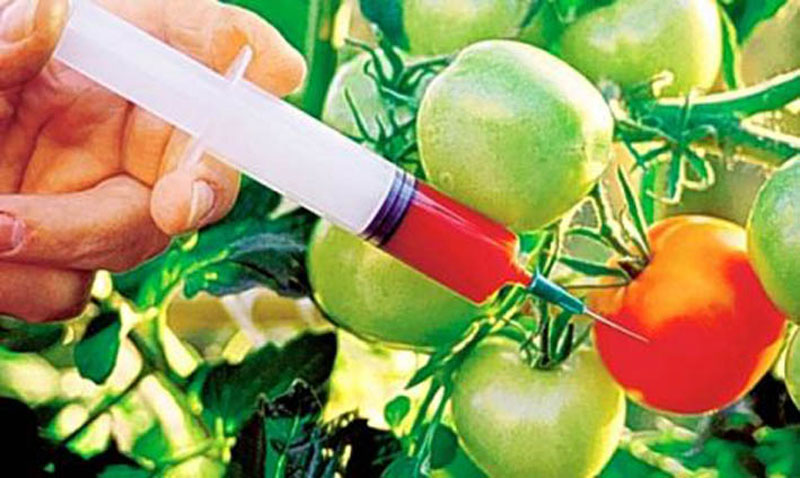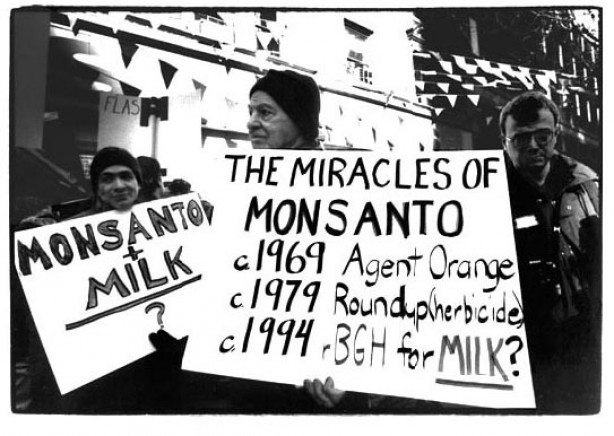
A three-judge panel at the Court of Appeals for the Federal Circuit ruled yesterday that a group of organic and otherwise non-genetically modified organism (GMO) farmer and seed company plaintiffs are not entitled to bring a lawsuit to protect themselves from Monsanto‘s transgenic seed patents “because Monsanto has made binding assurances that it will not ‘take legal action against growers whose crops might inadvertently contain traces of Monsanto biotech genes (because, for example, some transgenic seed or pollen blew onto the grower’s land).’”
In the ruling issued yesterday in the case Organic Seed Growers and Trade Association (OSGATA) et al. v. Monsanto, the Court of Appeals judges affirmed the Southern District of New York’s previous decision that the plaintiffs did not present a sufficient controversy to warrant adjudication by the courts. However, it did so only because Monsanto made repeated commitments during the lawsuit to not sue farmers with “trace amounts” of contamination of crops containing their patented genes.
Plaintiffs’ attorney, Dan Ravicher of the Public Patent Foundation (PUBPAT), views the decision as a partial victory. “Before this suit, the Organic Seed plaintiffs were forced to take expensive precautions and avoid full use of their land in order to not be falsely accused of patent infringement by Monsanto,” said Ravicher. “The decision today means that the farmers did have the right to bring the suit to protect themselves, but now that Monsanto has bound itself to not suing the plaintiffs, the Court of Appeals believes the suit should not move forward.”
The plaintiff farmers and seed companies began their legal battle in March of 2011, when they filed a complaint against agricultural giant Monsanto asking for a declaration that Monsanto’s patents on genetically engineered seed were invalid or unenforceable. The plaintiffs were compelled to file the suit because Monsanto’s patented seed can contaminate neighboring fields through various means including wind and insects, and the owners of those fields, such as plaintiffs, can then be sued by Monsanto for patent infringement.
The Organic Seed plaintiffs’ complaint detailed Monsanto’s abusive business and litigation tactics that have put several farmers and independent seed companies out of business. They also detailed Monsanto’s history of ruthless patent enforcement, going so far as investigating as many as 500 farmers each year for patent infringement by trespassing onto their land. The plaintiffs further detailed the harms caused to society by Monsanto’s GMO seed, including the proliferation of herbicide-resistant “superweeds” and environmental pollution. The plaintiffs set forth in their legal filings how the patents were legally deficient in several ways including that the covered technology has no beneficial social use and that the dozens of patents issued to Monsanto have illegally extended and entrenched its monopoly.
“Even though we’re disappointed with the Court’s ruling not to hear our case, we’re encouraged by the court’s determination that Monsanto does not have the right to sue farmers for trace contamination,” said Maine organic seed farmer Jim Gerritsen, president of lead plaintiff OSGATA. “However, the farmers went to court seeking justice not only about contamination, but also the larger question of the validity of Monsanto’s patents. Justice has not been served.”
While the court is relying on Monsanto’s promise not to sue farmers for unintentional contamination, a growing number of America’s farmers and consumers are concerned about genetic contamination of our food supply by Monsanto’s transgenic crops. While this lawsuit seeks to protect contaminated farmers from being accused of infringing Monsanto’s patents, the decision today allows farmers who are contaminated to sue Monsanto and Monsanto’s customers for the harm caused by that contamination without fear of a retaliation patent infringement claim against them by Monsanto.
“Today’s ruling may give farmers a toehold in courts regarding the unwanted contamination of their crops, but it does not protect our food supply from the continued proliferation of Monsanto’s flawed technology,” said Dave Murphy, founder and executive director of Food Democracy Now!, a co-plaintiff in the lawsuit. “The real threat of continued contamination of our nation’s food supply was only highlighted last week when Monsanto’s unapproved GMO wheat was discovered in an Oregon farmer’s field more than 10 years after it was legally planted in that state.”
The discovery of GMO contamination sent shockwaves through the Western wheat growers community and resulted in Japan and South Korea temporarily halting the acceptance of American wheat imports.
Despite the Court of Appeals’ Decision today the plaintiffs still have the right to ask the Supreme Court to review the Court of Appeals decision and ultimately reinstate the case. Ravicher said the plaintiffs are considering doing so. Complete background on the full lawsuit is available on the OSGATA website.
3 WAYS TO SHOW YOUR SUPPORT
- Log in to post comments
















